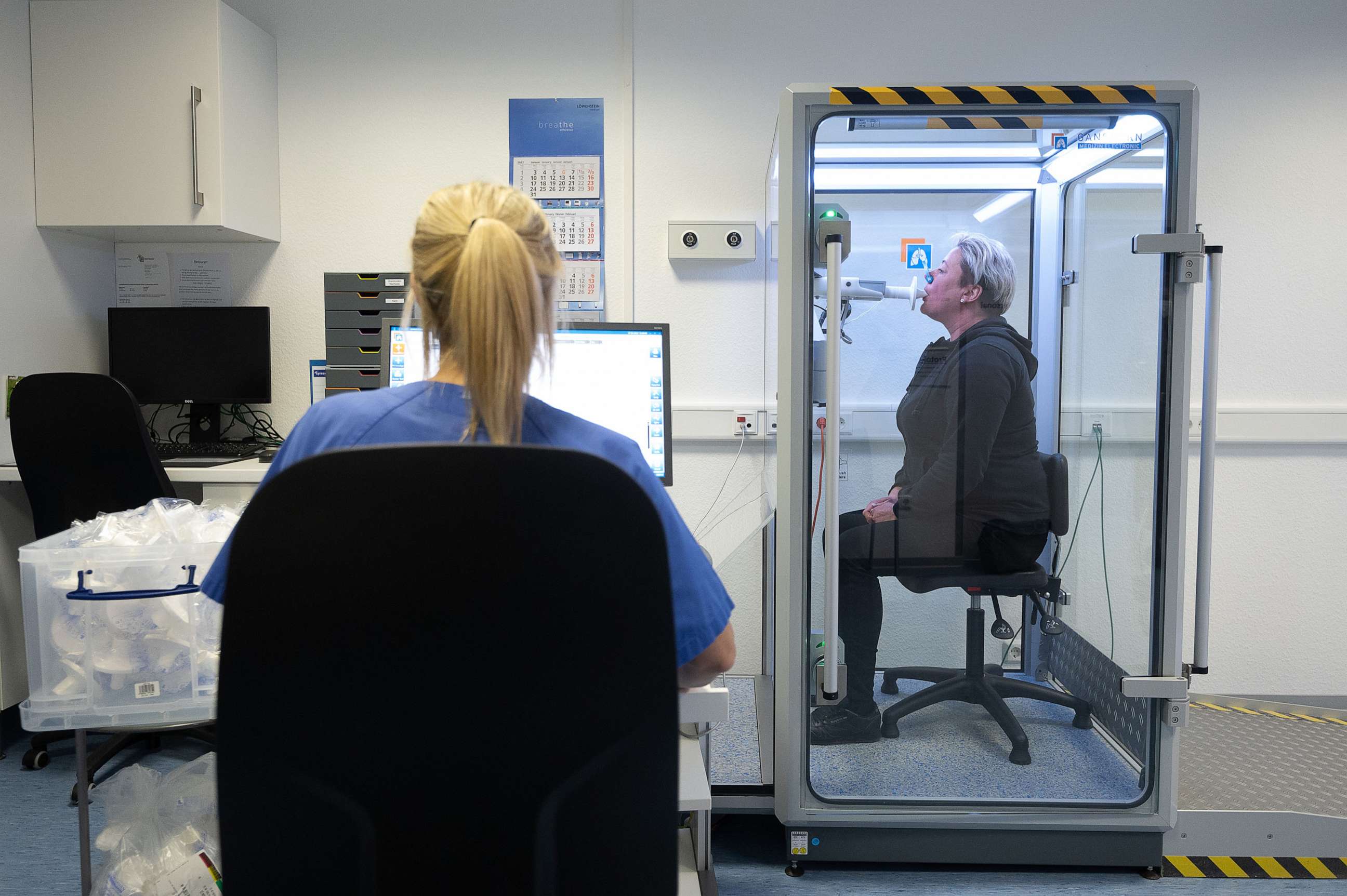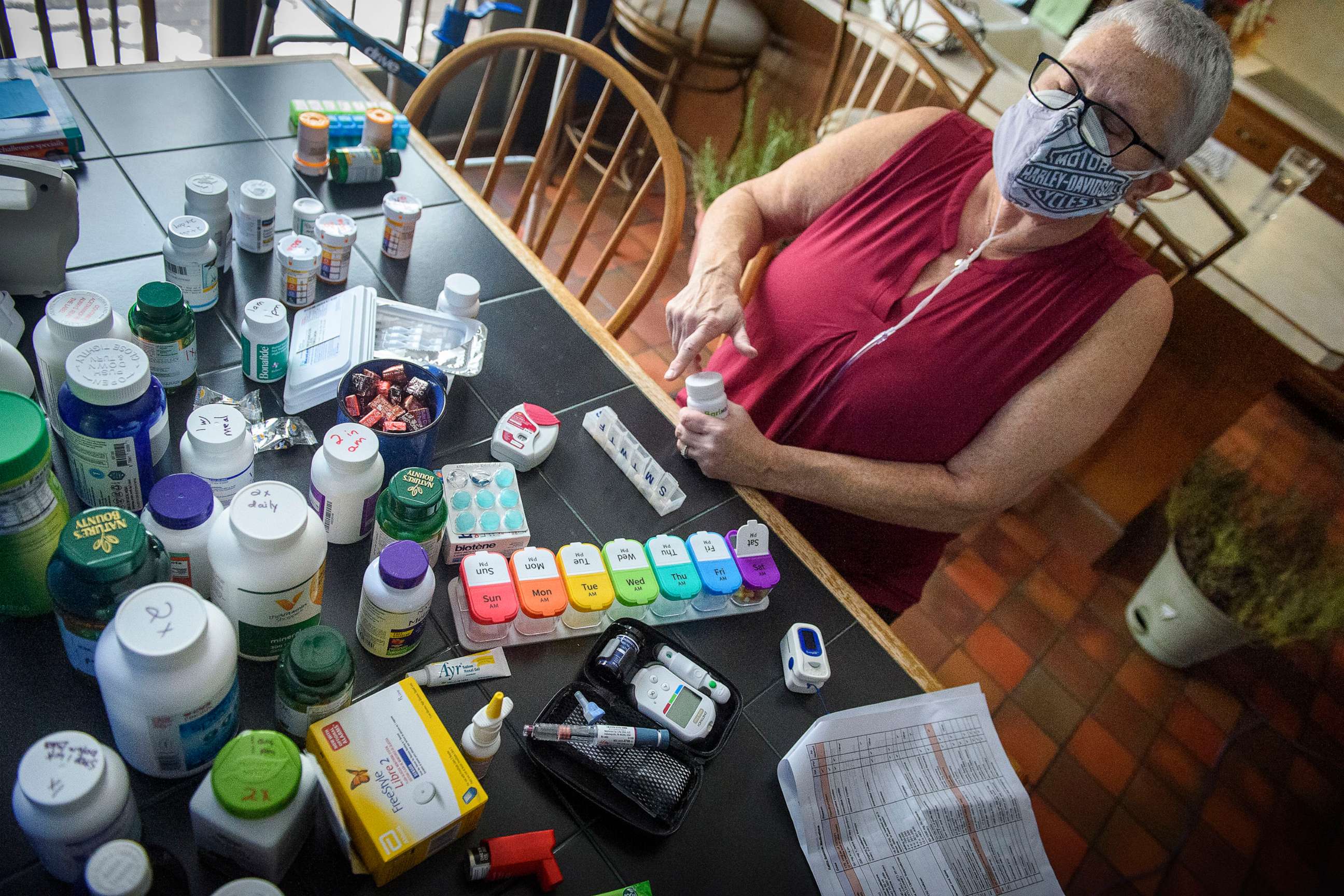At least 7 million people have long COVID. Here's how to support them
Patients can experience debilitating symptoms.
David Barnett was a bartender in March 2020 when he contracted COVID-19.
At first, Barnett could barely walk and had trouble breathing. As he recovered and quarantined, he felt like he was starting to get better.
After about a week of progress, "I stood up from my couch and I collapsed ... it was the weirdest feeling I've ever felt in my life. I felt like I was dying," he told ABC News.
It was the start of what Barnett calls a nightmare.
"I was developing a really high heart rate," he said. "I couldn't balance. I couldn't sit up anymore. I couldn't do anything."
He continued, "My heart rate will shoot up to 140 after I eat breakfast. In the mornings, I'm too confused to make my smoothies sometimes."
He is one of millions of Americans experiencing long COVID-19 symptoms across the country.
Long COVID is a condition that occurs when patients still have symptoms at least four weeks after they have cleared the infection. In some cases, symptoms can be experienced for months or years.

Symptoms vary and can include fatigue, difficulty breathing, headaches, brain fog, joint and muscle pain and continued loss of taste and smell, according to the Centers for Disease Control and Prevention.
It's unclear what causes people to develop long COVID but research is ongoing.
According to the CDC, about 1 in 13 Americans, or 7.5% of people who have previously contracted COVID-19, have developed long COVID.
"It can be anywhere from patients who are critically ill in the hospital who required ventilation … down to patients who may have been mild at first, treated at home, felt flu-like symptoms and never really got over those initial symptoms. So it is really a broad spectrum," Dr. Benjamin Abramoff, director of the Post COVID Assessment and Recovery Clinic and an assistant professor of physical medicine and rehabilitation at Penn Medicine, told ABC News.
David Speal, 40, from New York City, also contracted COVID-19 in March 2020 and became seriously ill, ending up in the hospital with a pulmonary embolism -- a blood clot that gets trapped in an artery going to the lung.
After he left the hospital, Speal was plagued by a consistently high heart rate.
'My heart just continued to race, just trying to talk on the phone, move around, use the restroom and it was really becoming an issue for me," he told ABC News. "The issue continued. I remember just trying to eat a meal. I got up and my heart was racing 160 beats a minute."
It took about another six months before Speal was diagnosed with long COVID.
Similarly, Barnett, who is in his 40s and was considered quite healthy by his doctors, never expected to become so debilitatingly ill.
It can be hard to know what to do when someone you know or love has long COVID. Here are some ways to support them through it:

Finding community
Disability rights activists say being disabled can be an isolating experience.
Barnett agrees: "That's what happens when you're sick like this. Everybody in my life has gone. I'm a ghost."
A Disability and Health Journal study affirms that disabled people experienced loneliness, low perceived social support and social isolation at significantly higher rates than people without disability.
If long COVID has created a generation of people with disabilities, it's important to help patients maintain supportive relationships and potentially find community with people experiencing similar conditions.
"Having the sense of community around any chronic illness is fundamental and long COVID is not an exception to this," Dr. Fernando Carnavali, a physician at Mount Sinai's Center for Post-Covid Care, told ABC News. "The sense of community offers to patients the opportunity to discuss" different topics related to their care, he said.
Barnett, who now helps run a website about long COVID, said peer support groups that have met over video conferencing and on instant messaging channels have helped him through this time emotionally.
Barnett said he and his newfound friends have helped each other in understanding what they're going through, as well as being a source of camaraderie and support.
"I'm so glad that we had this. I'm so glad that I had this to get through. It's been lifesaving," Barnett said.
Speal said when he first got his diagnosis, he felt alone until he joined a meditation group for others affected by long COVID. He wrote in the chat that he had a tough day but that he was glad the group had helped him relax.

"All of a sudden other people began responding 'Me too, me too, me too' and I was just like 'Wow, this really affected a lot of people,'" he said. "And just being in that group and seeing that gave me hope and reassurance that we were people working on this together."
Expecting and solving financial battles
Mia Ives-Rublee, the director for the Disability Justice Initiative at American Progress, warns long COVID patients about the "disability tax" -- the expenses that come with living in a world that is typically inaccessible to disabled people.
This includes things like having to pay for transportation rather than driving yourself, frequent doctor's appointments and having to find accessible housing,
She said that tax can certainly put a strain on someone's wallet. According to the National Disability Institute, disabled people pay an additional $17,690 each year to maintain the same standard of living "as a similar household without a member with a disability."
Ives-Rublee recommends creating a financial plan that prepares you for a lengthy illness. Barnett, who thought he would recover quickly, said he's facing financial struggles because he thought he would get better sooner.
Cheryl Bates-Harris, the senior disability advocacy specialist at the National Disability Rights Network, tells families experiencing long COVID to take advantage of programs that can help ease the financial burden.
This includes seeking out food assistance, local programs offering travel, housing stipends and more.
"There are many programs out there that will, on an individual basis, help people with utility bills, late rent payments," Bates-Harris told ABC News.
Learning to cut through the red tape on some of these programs – including disability insurance benefits or supplemental security income -- can be a group effort.
Social security disability claims are backed up, according to a report in The Washington Post. Bates-Harris said the underfunding and understaffing of the department has exacerbated issues in accessing government assistance.
Bates-Harris urges long COVID patients and their families to "start looking for assistance and services sooner rather than later."
Offering flexibility
Doctors said it is important to provide long COVID patients flexibility because they may not have the health or stamina of their peers.
This may mean offering them the ability to work from home rather than an office so they can take breaks more easily or don't overexert themselves.
Speal, who works at LaGuardia Community College in Queens, said he has started working again in his office but that it took a long time to be able to do so.
"Even giving this interview, about half a year ago or so I wouldn't really have been able to do it properly," he said. "I wouldn't feel good after. I'd be drained for the rest of the day."
He added, "The support of employers, HR departments is important. They need to understand that these conditions are debilitating. You cannot function properly."

Recognize that long COVID is a real condition
The experts and the patients agree one of the most common ways to support patients is to recognize the condition is real and is not a symptom of anxiety or another mental health disorder.
"There's accumulating evidence that there are physiologic changes within the body that are causing these long COVID symptoms," Abramoff said. "Certainly patients can be depressed for being sick for so long and not getting back to their activities, but it's not the primary cause of what's going on."
Speal said he also had to fight against the misconception of long COVID.
"This is not in our heads. This is a real thing that is happening," Speal said. "If you had a bout of COVID and you are not feeling yourself, you should do your very best to get evaluated and check it out."
Hundreds of centers have opened across the country, such as the ones where Abramaoff and Carnavali work, that bring together clinicians from different specialties to treat different long COVID symptoms.
"Long COVID continues to be an issue and the new variants out there are continuing to create, unfortunately, new COVID cases," Carnavali said. "One should actively look for the expertise that long COVID centers have where you can go and be evaluated by experts."




